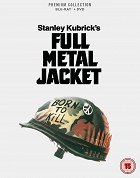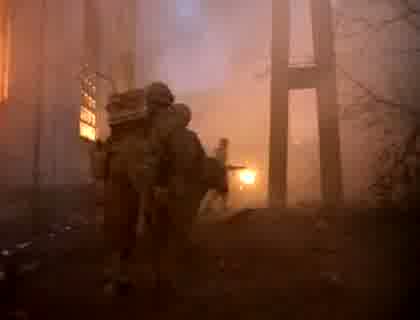Directed by:
Stanley KubrickCinematography:
Douglas MilsomeComposer:
Vivian KubrickCast:
Matthew Modine, Adam Baldwin, Vincent D'Onofrio, R. Lee Ermey, Dorian Harewood, Arliss Howard, Kevyn Major Howard, Ed O'Ross, John Terry, Kieron Jecchinis (more)VOD (3)
Plots(1)
A pragmatic U.S. Marine observes the dehumanizing effects the Vietnam War has on his fellow Marine recruits from their brutal basic training to the bloody street fighting set in 1968 Hue, Vietnam. (official distributor synopsis)
Videos (2)
Reviews (12)
As in the case of the other genres in which Kubrick has worked, his “war movie” ignores the usual techniques, formulas and motifs of the given category and focuses instead on the inner basic principles at their core. Other war and anti-war films put forth glorified or, conversely, disturbing scenes that adhere to the usual imperatives of “War turns boys into men and men into heroes” or “War is hell, or downright evil”. In Kubrick’s view, however, these are overly banal simplifications. Though the narrative of Full Metal Jacket is set in the environment of the Vietnam War, it addresses timeless themes. Kubrick is not interested in the individual soldiers, but in the war and its most destructive weapons, which, however, do not have any triggers or magazines. He explores the military indoctrination machine, depicts it as institutionalised radicalisation and exposes vocabulary and vulgarity as its most powerful tools. It has famously been said that the pen is mightier than the sword, but as R. Lee Ermey demonstrates to us with devastating effect, that statement cannot stand up to the verbal machine gun fired by a drill sergeant. Those who say that military service and war strip people of their personalities and transforms individuals into killing machines may be right, but only on the surface. With chilling dreadfulness, Kubrick makes it clear that the aim of basic training is not to erase a soldier’s personality, but to reprogramme it with extreme macho values, which make such a powerful impression on young men because they draw attention and radiate an impression of strength and self-confidence. The two halves of the film are not only connected, but also absolutely integral to each other. In fact, they do not show any simple “hard in training, easy on the battlefield” attitude, but rather the process by which soldiers adopt and amplify implemented patterns of behaviour as their own. During training, the soldiers do not learn only how to handle their weapons, but also how to project masculinity in its most extreme form. The subsequent episodic scenes set in Vietnam have a common denominator in the macho peacocking, when it all comes down to not losing face in front of one’s adversary, which means one-upping each other with the greatest excess possible. Fittingly (until the end), the adversary is no one in particular from the other side of the conflict, but just more Americans indoctrinated into the ideology of machismo. Feathers are initially ruffled only with vulgarities, but that soon becomes insufficient and the need to demonstrate dominance leads to real excesses, cruelties and atrocities. By pointing out the connection between indoctrination and the performance of machismo with its verbal manifestations, Kubrick created a disturbing and unfortunately timeless work. Though Full Metal Jacket is set in a training camp and war zone, the same tools are being used today in the macho indoctrination and radicalisation of young men on social media.
()
This is a really intense film, especially the first part, which leaves a big impression on you. It's loud, it's a real drill, but it beautifully shows how crazy the military can be. However, it needs to train people who are capable of killing, who are capable of going into battle and shooting. In the end, it turns out that even so, it is not easy. Even the second part is strong, when you see the soldiers, how everything is completely distorted.
()
The green-brain one-man-show in the first act is perfect, but as soon as the plot shifts to Vietnam, the film starts to creak. Actually, nothing important happens during those two acts. There is no deeper thought, nothing that would leave me with an emotional experience, which I would expect from a Kubrick film. Moreover, the "Vietnam" locations are rather unconvincing and Kubrick can't do battle scenes. I know better films about the Vietnam war.
()
Analytically, the least stimulating Kubrick, but who cares? Full Metal Jacket is great for the impressive distinctive character of each scene and for its interesting focus, which (as it’s usual with Kubrick) inwardly goes from characters to ideology and from action to consequences. In the opening part, the soldiers are put through hell, but we can enjoy the rhetorical show of a militant freak (Ermey should have got an Oscar for that), while its conclusion will chill you like an icicle; and even the part in Vietnam doesn’t spare much time following the conscience of the characters (rather the opposite: - "How can you shoot women or children?" - " Easy! Ya just don't lead 'em so much!"), and the final debate over the dying enemy is like a kick in the balls for the conscience. One of the best and most chilling (anti)war movies, hands down.
()
The first part of the film, which takes us into the training of the Marines, is great. Basically, it's about nothing more than a screaming and terrorizing sergeant who drives the soldiers to the edge of their physical and mental limits. This part of the won't let you breathe a sigh of relief, you just have to work hard and you can't even sniffle without permission. Among the soldiers, we have Private Pyle, who, although he's quite slow and lagging behind, has my admiration, because in this training I would pass out after two hours and I'm still cheering myself on. However, he doesn't handle it mentally; that blank maniacal expression of his will haunt me for a long time. It's just a pity that the climax of this plot didn't gain more momentum, it could have been a great theme for another film. The second part slows down a bit and gets a little boring, but once we get into combat, it's again a very good show. The only odd thing, the film is just under two hours long, and although I didn't feel like it dragged on for any length of time (unlike Space Odyssey, where the pace is slower), it felt like it was about 3 hours long, but no matter, I still liked it.
()



Ads